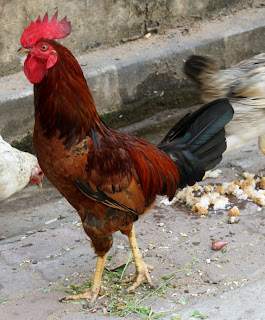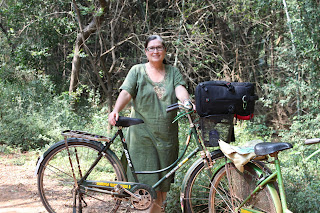Today we wandered through some of the farming communities nearby. A great deal of the work is done in traditional fashion. This is physically hard work. Here, teh crops that are seen include peanuts, cashews, rice, corn and hay in particular. The peanut crop has been in the ground a few weeks and will be ready in about another 5 months. The corn is being planted now with evidence that rice is about to go in. Hay is being harvested now.
This lady is planting corn. Her husband is using basic irrigation to get water into the field
Farmers in India are under some tremendous pressure. The Monsanto story which has had such a pervasive impact in North America is beginning to repeat itself here. The papers are full of stories about farmers commiting suicide. Here is one example:
"Here's the way it works in India. In the central region of Vidarbha, for example, Monsanto salesmen travel from village to village touting the tremendous, game-changing benefits of Bt cotton, Monsanto's genetically modified seed sold in India under the Bollgard® label. The salesmen tell farmers of the amazing yields other Vidarbha growers have enjoyed while using their products, plastering villages with posters detailing "True Stories of Farmers Who Have Sown Bt Cotton." Old-fashioned cotton seeds pale in comparison to Monsanto's patented wonder seeds, say the salesmen, as much as an average old steer is humbled by a fine Jersey cow.
Part of the trick to Bt cotton's remarkable promise, say the salesmen, is that Bollgard® was genetically engineered in the lab to contain bacillus thuringiensis, a bacterium that the company claims drastically reduces the need for pesticides. When pesticides are needed, Bt cotton plants are Roundup® Ready -- a Monsanto designation meaning that the plants can be drowned in the company's signature herbicide, none the worse for wear. (Roundup® mercilessly kills nonengineered plants.)
Sounds great, right? The catch is that Bollgard® and Roundup® cost real money. And so Vidarbha's farmers, somewhat desperate to grow the anemic profit margin that comes with raising cotton in that dry and dusty region, have rushed to both banks and local moneylenders to secure the cash needed to get on board with Monsanto. Of a $3,000 bank loan a Vidarbha farmer might take out, as much as half might go to purchasing a growing season's worth of Bt seeds.
And the same goes the next season, and the next season after that. In traditional agricultural, farmers can recycle seeds from one harvest to plant the next, or swap seeds with their neighbors at little or no cost. But when it comes to engineered seeds like Bt cotton, Monsanto owns the tiny speck of intellectual property inside each hull, and thus controls the patent. And a farmer wishing to reuse seeds from a Monsanto plant must pay to relicense them from the company each and every growing season.
The cycle of debt continues into a downward spiral. And to be sure, water problems are adding to the crisis. In this most recent instance dam construction nearby was a significant contributor. While changes in water availability may be the jumping point for some farmers in India, it has been the globalization model of agriculture hyped by companies like Monsanto and Cargill that have led farmers to the cliff in the first place.
As renown physicist and anti-globalization activist Vandana Shiva (who has also fought against big dam construction) said in an interview with Democracy Now! in 2006:
A few weeks ago, I was in Punjab. 2,800 widows of farmer suicides who have lost their land, are having to bring up children as landless workers on others' land. And yet, the system does not respond to it, because there's only one response: get Monsanto out of the seed sector--they are part of this genocide -- and ensure WTO rules are not bringing down the prices of agricultural produce in the United States, in Canada, in India, and allow trade to be honest. I don't think we need to talk about free trade and fair trade. We need to talk about honest trade. Today's trade system, especially in agriculture, is dishonest, and dishonesty has become a war against farmers. It's become a genocide."
There are also weather patterns affecting the crops.
I am impressed with Indians who I see working hard in rural India daily. It is sad to see how western culture is seeping in. While some of it is good - not all is. Values are changing and the materialsm and commercialism so pervasisve in the West is more and more evident.



























